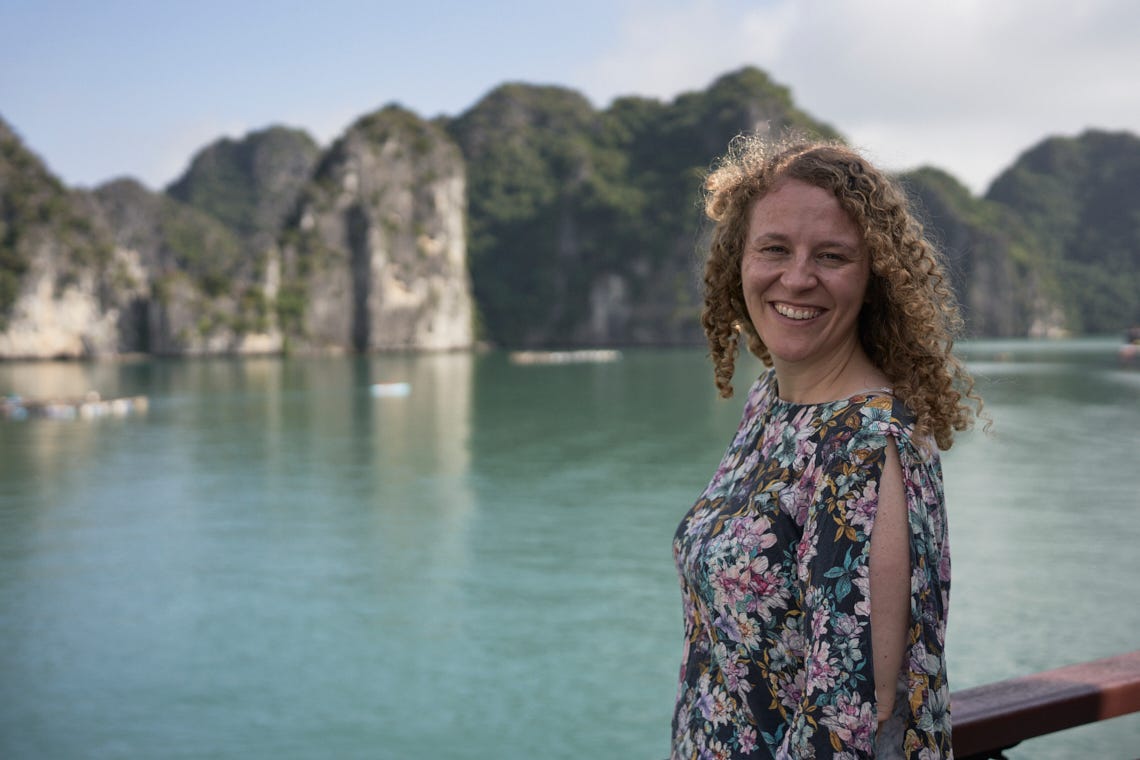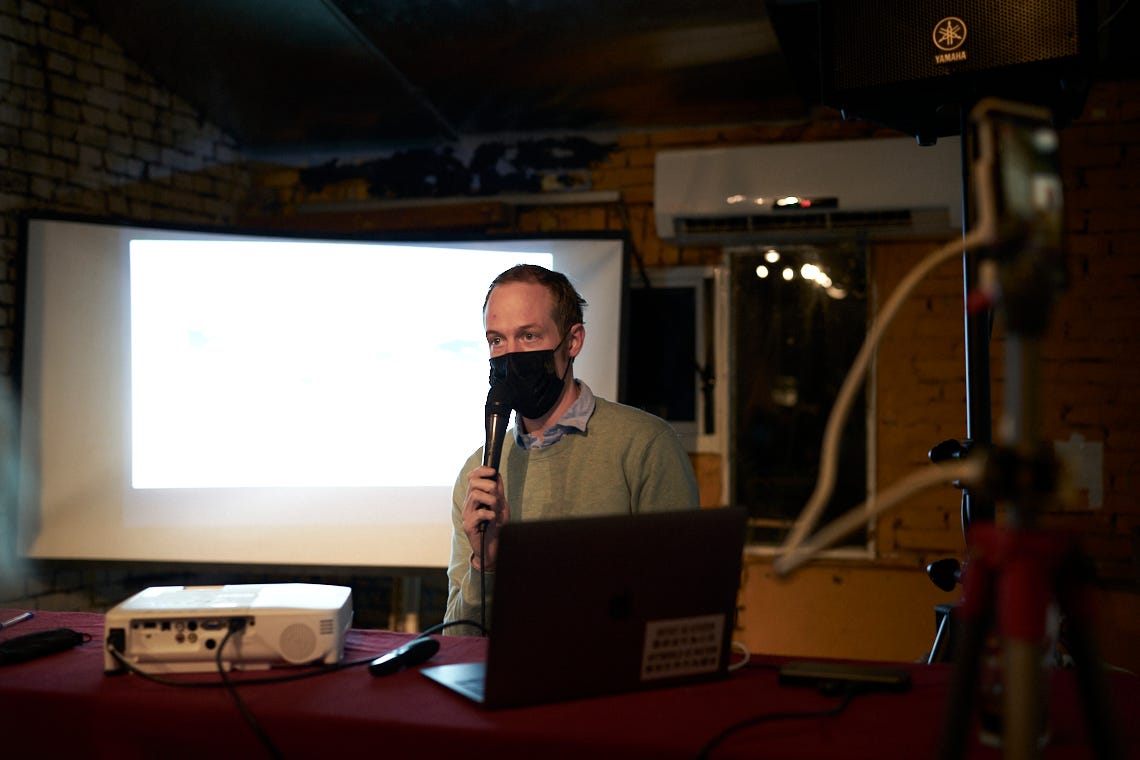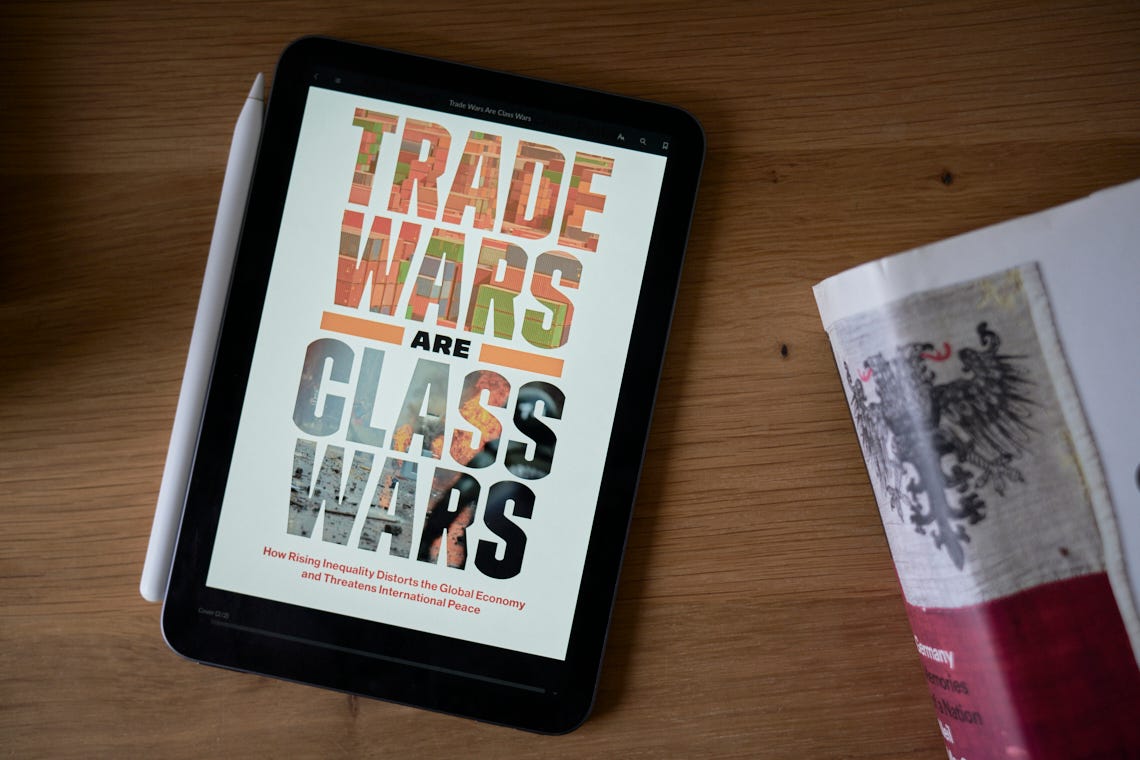This is the October, November, and December issue of benerkenswert. Time flies! I really hope the year ended on a lighter note for you than it began for many of us. Overall I think there is much reason to be optimistic. Happy holidays!
Find the issue in all its glory on my website. Click here for an automated (and hence rather inauthentic) German translation provided by Google.
Time in and around Taiwan
The last months were quite busy and exciting. Living abroad is often associated with wonder and adventure (just open Instagram…). In reality, you do have to work just as much (or more) and the adventure is often in the mundane: doing groceries, dealing with public authorities, figuring out social codes, etc. What is exciting when you are on vacations can be taxing after a long day at work; resources you are used to at home - friends, your favorite comfy food, even speaking your language - have to be rebuild. It’s often fun, sure, we wouldn’t be here otherwise! But not always. Sometimes it’s just a clog.
Not so much in the last months, though! I won’t discuss our psychologies here, and much is probably just the normal ups and downs anyway. (And the weather? Fall is a great time to be here!) Still, it shouldn’t keep us/you/anyone from appreciating the good times whenever we are gifted with them!
One reason I wasn’t using this outlet much the last months was that I experimented with writing about stuff elsewhere. I have the slight itch this newsletter will in the future become what it was supposed to be in the beginning: a collection of points and ideas, more channel of distribution than journal of record. (It was never meant to be an online diary and hopefully never felt like one, I’m neither in my 20s nor a celebrity.)
I was giving a seminar at the National Taiwan University of Science and Technology at the beginning of October. Taiwan’s universities are less open to opportunistic collaborations with independents than European and American ones and I was happy it worked out!
The Oslo Freedom Foundation, an event series by the Human Rights Foundation, took place in Taipei at the beginning of November. A fun event, its bombastic optimism was a nice small time machine into the 2010s. I wrote much more about in a blogpost.
Anna had a conference in Vietnam mid November. Luckily I was able to join her. I did the digital nomad thing in Hanoi (in the hotel and around…), before we spend a few days on Cat Ba, the biggest island in Ha Long Bay. Vietnam’s tourism industry is still recovering from Covid and it all felt nicely rugged and empty in an authentic way. Here are some photos of Cat Ba, Hanoi, and stuff on the way for those not following me on The ‘Gram.
Our dear friend and my bib-buddy Christina will to our grand sadness leave Taipei soon for Berlin. She spent several months in Taiwan with a Taiwan Fellowship to study transitional justice („Vergangenheitsbewältigung“) here. I was happy to spend a day in Chiayi with her on a public study trip to learn more about how Chiayi‘s dealt with the 228 incident/massacre. If you are interested in the history and/or want to see the pictures, here are five essays on 228 in Chiayi, the Chiayi 228 National Memorial, the Chiayi 228 Memorial, Chiayi‘s Old Prison, and Chiayi Park.
Oh Germany
A friend of us, the German-Chinese Liya Yu, organizes a regular salon in Taipei, much frequented by the small German journalist and policy expert crowd. After a heated discussion we had weeks before on Germany and Germany‘s China politics, she invited me to give a short presentation. I chose to present some armchair economics building on Klein and Pettis‘ fascinating “Trade Wars are Class Wars” (see below). It was fun to talk about economics in a way I didn’t expect! There is an interesting way in which having a lot of data makes you The Expert immediately, much different from mathematical theories or more vague results (that people don’t trust anymore) from experiments in the social and business studies. I liked it!
One more thought, even though this is not the place to go into the science nor politics. Preparing the presentation, I was surprised and a bit worried how the distance to Germany makes it even easier to be critical and grave instead of nostalgic. The drumbeat of alarming reports on the whole China-Taiwan issue is a strong and daily reminder how valuable, important, and vulnerable living in a free, peaceful society is. It is depressing to see how political entrepreneurs (public „intellectuals“, politicians, …) crumble away good will and trust in society for their own benefit. How they often lean into primitive reflexes. Germany often lacks the US in cultural developments by about five years. Please let us not repeat the idiocies of the years following 2016!
Recommendations
Movie: Zhou Meiling, Untold Herstory (★★★★☆)
Zhou Meiling’s “Untold Herstory” is a Taiwnese movie about a group of women imprisoned on Green Island during the time of White Terror. Charged for political reasons, they had to spend an unknown amount in one of Taiwan’s best-known and most-feared re-education camps for political prisoners. The film very artfully presented their struggle without using either excessive psychological nor bodily violence (compared with similar movies), thus putting the mere tragedy of imprisonment even stronger into focus. It combines the production value of modern cinema (great actors, cinematography, and locations!) with the intimacy of indie movies and (for us) foreign story arcs and emotional peaks of Asian movies. Well worth it!
Book: Matthew C. Klein & Michael Pettis, Trade Wars are Class Wars (★★★★☆)
I mentioned Klein and Pettis’ “Trade War’s are Class Wars” above. It was a quite impactful, revelatory book for me in the last year and I will just be able to scratch the surface here. The book addresses global trade imbalances (especially China‘s and Germany‘s trade surpluses, think “Exportweltmeister”), arguing that they weaken overall global prosperity. This critique is not new and in the past I have often put it aside as simple envy. (Klein and Pettis too are Americans.) Yet, it is their detailed analysis of German economy that really made me think. Klein and Pettis argue that Germany’s export strength is basically a compensation for a weak internal economy due to high inequality, a policy set up that favors capital over labor, historic reasons around the Euro, and the way profits are not distributed within German society. The book is very critical about common myths of „Made in Germany“, German engineering ingenuity, and general narratives of cultural or moral superiority. These stories ignore how much of the competitive advantage can be explained by currency devaluation (in G’s case via the Euro) and hidden subsidies through wage suppression. What’s worse, these story feed into nationalist tendencies while making positive change more difficult! (The same is even more true for China.)
I’m generally careful with strong shifts in how I see the world and it is important to not deduce conspiratorial intentions from broad systemic trends. This book is not about people or groups of people. Yet, it is a great, important, and certainly not wrong account of smoldering societal problems that interestingly run contra current trend lines of right vs. left, alt-right vs. woke, whatever. I am always happy about any explanation that doesn’t fall back to “the other side is wrong”. Surface conflicts like these have often hidden structural tensions that need to be addressed when you want to make progress in solving them. (That’s the systemic coach in me speaking!)
A simple example how the book shifted my thinking is on the broad narrative around „Fachkräftemangel“. Why does this not seem to be a problem when building new car factories abroad (as happened much more than in Germany in the last 20 years)? Why is this a problem given that Germany is so proud of its dual education system? (It’s definitely not lack of migration, Germany has one of the highest share of immigrants globally!) More generally: why is it a problem at all given that companies “paying more” (and be it for education) should just lead to more people educating themselves in certain ways? It’s the job “market” after all! This seems to be just another weird way how the proponents of boundary-less capitalism somehow seem to completely lack trust in the basic idea of supply and demand… “how weird indeed”.
Music: The Cotton Modules, Shadow Planet (★★★☆☆)
I was quite fascinated to play with some of the new AI tools released in the past months (see the links below), and this album fits rather well. There is a colorful backstory including lockdown, old-school compositions, old-school cassettes, creative collaboration, and – well – large language models (LLM). To summarize it: Two guys were bored, one of them (Jesse Solomon Clark) a composer, the other (Robin Sloan) a… something-something AI-artist. Clark develops some vague ideas, sends them via cassette to Sloan, who uses an AI to play with it. After some back-and-forth they have a song. (The vocals are also machine-generated!)
A few thoughts. First: as with other AI generated “content”, the result is not mechanic but rather chaotic and fractal. This shouldn’t be surprising for those of you familiar with self-organization and fractals in theory or other LLMs – but still, always fascinating nonetheless!
Second: The album reminds me of wild indie music of the kind of Sufjan Stevens as well as classical DJ sets (e.g., Jan Blomqvist at Burning Man 2016). The basic process is very similar to DJs: picking small snippets, mixing them together, transgressing between different tracks and styles, etc. Part of this is based in Shadow Planet’s approach, part is the unpredictability and randomness of the AI. My association with indie musicians is more based in small random flowers of weirdness. Here the difference is bigger, as these are intentional for human artists but “just” artifacts for the LLM. The fact that Clark and Sloan work on the pieces dilutes this difference, but you need quite a lot of human intervention to create the sense of intentionality (including theme development, sensible changes of harmony, citation of styles and colors throughout the album or at least tracks, etc.).
Third, music is generally a fascinating medium for AI-automated content as we consume on a more personal level, debate it less, and it is thus easier to imagine algorithmically created ad-hoc music depending on user inputs. (A bit like a personal pocket-DJane.)
Fourth, the example emphasizes the current trend to switch the focus of creative work from the result to the process, to focus on the act of creation – to make art a performance art. I think the story of how the album was created creates part of the charm, and it would be less interesting if the story were “I clicked a button and the AI did this”. This mirrors how other forms of AI creation (chat bot output, image output) often prominently features the prompt to create it. It’s part of the story.
Overall, while I think the music is nothing special as music, it is definitely a fascinating example and illustration of where we are headed!
Links
On Greater China: The best article I read in the last months was an excellent summary on the historical, political, and military dimensions of the tensions between China and Taiwan (New Yorker)
Further articles on politics in China: Photo-rich profile on how Xi changed China (CNN); Martin Wolf argues the Chinese economy is facing big challenges as the consumer share on the economy shrinks, (providing current data in line with Klein & Pettis reasoning, FT)
Further articles on Chinese economics: John Burn-Murdoch argues it becomes more and more difficult to get reliable economic data from China (FT); Apple is moving production to India trying hard to reduce its reliance on China (Economist); Even a successful military campaign of China against Taiwan would mean a “Pyrrhic victory” (CSIS)
On AI: OpenAI released a chat interface for its 2-year old GPT model, helping to move LLMs (large language models) much closer into the mainstream. Playing with it is a fascinating window into what AI might bring into our future, I highly recommend trying it out at ChatGPT!
The link of the month for me was nonetheless Googles AI bot that allows to access its vast amount of digitized books. While ChatGPT is fund but with its tendency to hallucination, I think this kind of search leading to actual information is much more helpful on a personal basis! Talk to Books
Further articles on AI, often focusing on the broader possible societal changes: How AI chat bots will change how students do their homework and why that too is not the end of the world (Stratchery); StackOverflow tries to get ahead of the wave of seemingly-but-only-seemingly correct code by banning AI-generated code
Further random stuff:
A fascinating essay on olive harvest and the production of olive oil; Is 2023 about new avenues and experiments? (Written by one of the musicians featured above); Essay on the phenomenon of Mr. Beast, a YouTuber who gave a man half a million to live in a circle for 100 days; A Twitter thread on the difference between buddies and friends in Germany (the comments are another humorous view into the mirror for Germans)






